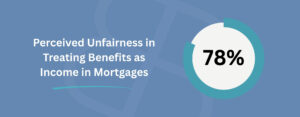The UK’s Public Opinion on Using Benefits in Mortgage Applications [May 2025 Study]

New research from Boon Brokers reveals a widespread belief amongst the working population that treating some benefits as income in mortgage applications is unfair and impacts incentives to return to work. Download the full research file in the footer of this article.
Key Findings:
- 88% believe non-permanent disability living allowance (now known as PIP) should not be treated as income in mortgage applications
- 81% did not know benefits can be counted as income in mortgage applications
- 78% believe it is unfair that the Financial Conduct Authority (FCA) allows benefits to be treated as income in mortgage applications
- 76% believe allowing benefits as income impacts incentives to return to work
- 66% believe that there is a link between benefits being used as income in mortgage applications and rising UK property prices
Data Summary:
| 1,000 Respondents Across the UK |
| All Age Ranges Covered |
| All Respondents are Working |
| Conducted by TLF Research |
Amongst a growing national debate surrounding the current role and impact of benefits in the UK, Boon Brokers conducted its own independent survey into the public opinions toward benefits as income in mortgage affordability assessments.
This study focused on employed and self-employed individuals, assessing their general knowledge of benefits that are used in mortgage applications, and to gauge the overall public opinion around the perceived fairness of this practice.
The research reveals a clear consensus: most are unaware that benefits can be used as income in mortgage applications, and the majority view the system in place as unfair.
Public Understanding of Benefits in Mortgage Applications
Data revealed that an average of 81% of respondents were unaware of the full range of benefits that lenders are likely to accept as income when it comes to assessing the affordability of a borrower’s mortgage application.
In the study, Boon Brokers listed the most common benefits that are used in mortgage applications, including: Personal Independence Payments (PIP), Attendance Allowance, Maternity Allowance, Universal Credit, Disability Living Allowance, Pension Credit, Child Benefit, and Carer’s Allowance.
While a higher percentage of respondents were unaware that Disability Allowance (83%), Maternity Allowance (87%), and Universal Credit (84%), can be treated as income in a mortgage application, the overall lack of awareness highlights a clear gap in the public’s understanding of how the current benefits system can be applied to mortgage applications.
It is important to note that individual benefits and their applicability to be treated as income is not currently mandated by any regulator. As such, the wide-variety of benefits that can be used are subject to the lender’s discretion and could be a main contributor to the inconsistent understanding.
Public Opinion on Fairness
As part of this study, Boon Brokers included the context of current regulations set by the Financial Conduct Authority (FCA) – the UK’s financial regulator who is responsible for maintaining integrity, fairness, and stability within the financial services market.
To be clear, the FCA does not have an individual policy or stance on the inclusion or exclusion of state benefits in any affordability calculation. Instead, the FCA permits lenders to determine which benefit types can be factored into their affordability criteria.
To ensure clarity on this fact, a detailed definition of the FCA’s role and its guidance was provided to all survey respondents: “The Financial Conduct Authority (FCA) is the UK’s financial regulator, responsible for ensuring a fair and stable financial services market.”
Following this, respondents were asked to share their views on whether specific benefits should be treated as income in mortgage assessments.
The study found a notable divide between public opinion and the regulatory philosophy.
While the study revealed a consistent opposition to allowing benefits to be treated as income in a mortgage application, standout statistics found 89% of respondents were against the inclusion of Attendance Allowance and Maternity Allowance, and 85% against Universal Credit being considered as part of income calculations.
An average of 81% of respondents believed that the benefits listed in the survey should not be allowed to be treated as income in a mortgage application, with 78% of respondents thought the inclusion of all benefits to be ‘unfair’.
Impact of Benefits on Incentives to Work
The study reveals a staggering 88% of respondents believed that income from Non-Permanent Disability Living Allowances (DLA), should not be allowed to be treated as income in a mortgage application.
For context, in accordance with the UK Government handbook, a disability may include a physical or mental condition that causes impact on daily life tasks. This impact may be temporary or fluctuate over time. Examples of non-permanent disabilities can include:
- Mental Health
- Musculoskeletal Injuries (Fractures, back pain, sprains and strains, etc.)
- Post-treatment or Recovery
- Chronic Illness Flare-Ups (asthma attacks, migraines, etc).
- Pregnancy-Related Conditions
As one of the highest percentage results recorded among all listed benefits surveyed (88%), the response suggests that many respondents perceive temporary disability-related income differently from long-term earned income, specifically when it comes to assessing mortgage affordability.
In addition, the data also revealed 76% of respondents believed that allowing benefits to be used as income in mortgage applications would impact on people’s motivation to find/return to employment.
It is important to note that the link between benefit income and work incentives is a complex issue.
While the study highlights concerns around fairness, the data points to a common perception among respondents: that allowing individuals to secure mortgages through benefit income, without the need to return to work, may reduce the overall incentive to seek employment.
As such, the research indicates a majority concern that temporary, or non-earned income, being treated as regular income in mortgage applications could disincentive employment among those who are able to work.
This view naturally ties into broader debates about social welfare, employment, and housing policy that would benefit from further research and analysis.
It stands to reason that if people can function with benefit income and have the ability to purchase property with it, it creates a disincentive to return to the workplace. This is clearly the overwhelming view from the general public.
Gerard Boon Managing Director (B.A Hons, CeMAP, CeRER)
Benefits, Competition, and Rising Property Prices
The final section of our research assessed the public perception and relationship between benefits being treated as income in mortgage applications and the ongoing rise in UK property prices.
A notable majority (66%) of respondents assumed a link between the inclusion of benefit income in mortgage affordability assessments and rising property prices in the UK.
While property inflation is influenced by multiple factors, from interest rates and economic growth to rental sectors and housing supply, the data shows a clear correlation in the public view that treating benefits as income may be contributing to an increasing demand for purchasing property.
This shared sentiment from respondents once again feeds into a broader narrative about fairness and competition within the UK housing market.
The Public’s Conclusion
This new research places a spotlight on the UK public’s awareness of how benefits can be treated as income in mortgage applications, as well as a widespread belief among respondents that it is unfair for benefits to contribute to mortgage affordability.
Concerns about incentives to work and the impact on the housing market’s competitive dynamics further underline the complexity of this issue. The study’s data reveals a snapshot of the public’s general view which amalgamates into a wider issue of social policy and mortgage regulation.
Crucially, public perception on this topic has demonstrated an eagerness for lenders, regulators, and policymakers to review and ensure a fair and sustainable mortgage market in the UK.
Notes to the editor
Research was conducted between 13th and 20th May 2025 amongst 1,000 applications who are either employed or self-employed.
About the Researcher:
The Researcher for this article is Gerard Boon (B.A Hons, CeMAP, CeRER). Mr. Boon is the Managing Director of Boon Brokers Limited, a Directly Authorised Online Mortgage, Insurance & Equity Release Brokerage in the U.K. Boon Brokers boasts over 9,000 clients across the country and is quickly scaling year on year. Mr. Boon is passionate about Artificial Intelligence in the industry. During his studies at the University of Leeds in 2018, he achieved a First classification for his dissertation project titled “Artificial Intelligence in Financial Intermediation: An Investigation into the Prospects of Robo-Advice Developments for Independent Mortgage Brokers in the United Kingdom”. Since 2018, AI technology has rapidly developed. Mr. Boon is hoping to update his research on the topic following this survey.
Download the Full Results of The Benefits and Mortgage Survey May 2025









